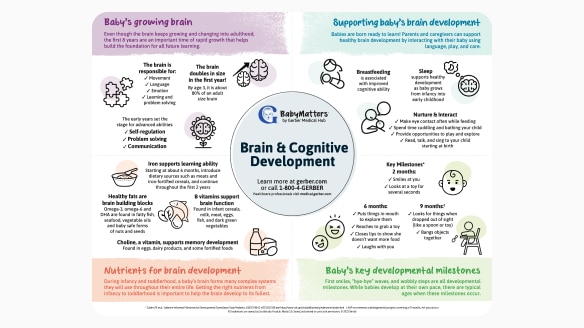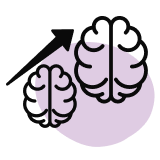Brain & Cognitive Development - BabyMatters™
3 min read • By: Gerber Medical Hub

Quick summary
The first 8 years are crucial for a baby's brain growth, forming the basis for future learning. Movement, language, emotion, and problem-solving are vital brain functions. By age 3, the brain is 80% its adult size, doubling in the first year. Interaction, play, and care aid brain development, while breastfeeding and nutrition (iron, healthy fats, B vitamins, choline) are important. Milestones like smiling, grabbing toys, and exploring objects happen around 2, 6, and 9 months.
picture_as_pdfVIEW PDF INFOGRAPHIC
Table of contents
Baby's growing brain
Even though the brain keeps growing and changing into adulthood, the first 8 years are an important time of rapid growth that helps build the foundation for all future learning.

The brain is responsible for:
- Movement
- Language
- Emotion
- Learning and problem solving

The early years set the stage for advanced abilities:
- Self-regulation
- Problem solving
- Communication

The brain doubles in size in the first year! By age 3, it is about 80% of an adult size brain.
Supporting baby's brain development
Babies are born ready to learn! Parents and caregivers can support healthy brain development by interacting with their baby using language, play, and care.

Nurture & interact
- Make eye contact often while feeding
- Spend time cuddling and bathing your child
- Provide opportunities to play and explore
- Read, talk, and sing to your child starting at birth

Breastfeeding is associated with improved cognitive ability

Sleep supports healthy development as baby grows from infancy into early childhood
Nutrients for brain development
During infancy and toddlerhood, a baby’s brain forms many complex systems they will use throughout their entire life. Getting the right nutrients from infancy to toddlerhood is important to help the brain develop to its fullest.

Iron supports learning ability
Starting at about 6 months, introduce dietary sources such as meats and iron-fortified cereals, and continue throughout the first 2 years

Healthy fats are brain building blocks
Omega-3, omega-6 and DHA are found in fatty fish, seafood, vegetable oils and baby safe forms of nuts and seeds

B vitamins support brain function
Found in infant cereals, milk, meat, eggs, fish, and dark green vegetables

Choline, a vitamin, supports memory development
Found in eggs, dairy products, and some fortified foods
Baby's key developmental milestones
First smiles, “bye-bye” waves, and wobbly steps are all developmental milestones. While babies develop at their own pace, there are typical ages when these milestones occur.

Key milestones 2 months:
- Smiles at you
- Looks at a toy for several seconds

Key milestones 6 months:
- Puts things in mouth to explore them
- Reaches to grab a toy
- Closes lips to show she doesn’t want more food
- Laughs with you

Key milestones 9 months:
- Looks for things when dropped out of sight (like a spoon or toy)
- Bangs objects together
* Zubler JM et al., Evidence-Informed Milestones for Developmental Surveillance Tools Pediatrics (2022) 149 (3): e2021052138 and https://www.cdc.gov/ncbddd/actearly/milestones/index.html.
† AAP recommends a developmental progress screening at 9 months. Ask your doctor.
All trademarks are owned by Société des Produits Nestlé S.A.,Vevey,Switzerland or used with permission. © 2023 Nestlé
